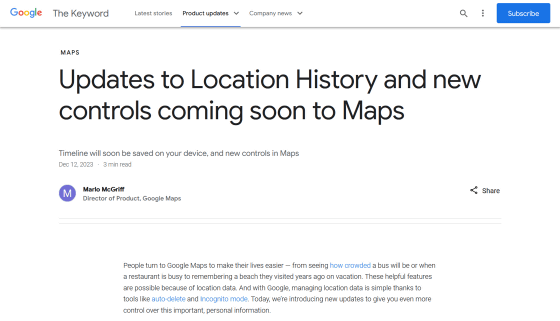Google Maps update makes it impossible to provide data on ``users who were near the crime scene'' to law enforcement agencies

Google Maps has a feature called
Updates to Location History and new controls coming soon to Maps
https://blog.google/products/maps/updates-to-location-history-and-new-controls-coming-soon-to-maps/

Is This the End of Geofence Warrants? | Electronic Frontier Foundation
https://www.eff.org/deeplinks/2023/12/end-geofence-warrants
Google Changes Map History Tool, Ending Geofence Warrants - Bloomberg
https://www.bloomberg.com/news/articles/2023-12-15/google-changes-map-history-tool-ending-geofence-warrants
A ``geofence warrant'' issued by law enforcement agencies to Google for purposes such as criminal investigations orders Google to submit location data of all devices that passed through a target area during a specific time period. According to technology media WIRED , law enforcement agencies have been requesting information from Google using geofence warrants since 2016, and the number is increasing year by year.
Because geofencing warrants do not target specific individuals or devices, large amounts of data about ordinary people that are not actually related to criminal investigations are handed over to law enforcement agencies and placed on suspect lists. This is a concern. In fact, in the past, there have been reports of police requesting Google to disclose his identity to a man who happened to pass by a house that had been burglarized during his daily cycling routine.
In 2020, geofencing warrants were established under the Fourth Amendment to the U.S. Constitution: ``A warrant shall be issued only upon probable cause, supported by oath or affirmation, and shall not determine the location to be searched and the location to be arrested. It has been ruled unconstitutional, as it goes against the phrase, ``It must specifically indicate the person or property to be seized.'' Google is also working to improve its location history, and has announced that in 2022 it will automatically delete information about visits to highly private places such as abortion clinics and domestic violence (DV) shelters.
Google announces that it will automatically delete information about visits to highly private places such as abortion clinics from location history - GIGAZINE

On December 12, 2023 local time, Google announced a major update to Google Maps. There are three changes in this update:
◆1: Save location history (timeline) on the user's device
Previously, location history was stored in Google's database, but after the update, it will be stored on the user's device. In addition, if you turn on Location History, which is off by default, it was previously set to be automatically deleted after 18 months, but after the update, the default automatic deletion period has been shortened to 3 months, and you can change the setting. If not, data older than 3 months will be automatically deleted.
When purchasing a new smartphone or if you are worried about losing your smartphone, you can also back up your location history to Google's cloud. In this case, the backup data will be automatically encrypted and cannot be read by anyone, including Google. The Location History update will roll out gradually on Android and iOS through 2024, and eligible users will receive a notification.

◆2: Activities related to a specific location can be deleted directly from the map
Let's say you're planning a surprise birthday party and use Google Maps to head to a nearby cake shop. With the new update, you will be able to see all cake shop related activities in one place and easily delete activities such as searches, directions, visits, and shares with just a few taps. The ability to remove related activities from Maps will be rolling out to Android and iOS in the coming weeks.

◆3: Location information can be controlled directly from the blue dot on the map
A feature that allows you to instantly access key location controls by tapping the blue dot that indicates your current location on Google Maps will be rolled out to Android and iOS in the coming weeks.

The electronic frontier foundation, a digital privacy rights advocacy group, reports that a major update to location history will effectively render law enforcement geofencing warrants inoperable.
The Electronic Frontier Foundation says it can't declare complete victory because Google's collection of user information goes beyond location history, but it is happy to at least effectively end geofencing warrants. “This is very welcome news for technology users as we approach the end of 2023.”
Related Posts:
in Web Service, Posted by log1h_ik






